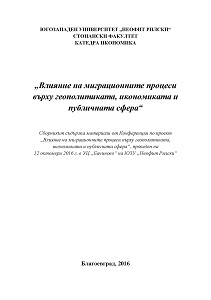ОТНОШЕНИЕТО КЪМ БЕЖАНЦИТЕ В БЪЛГАРИЯ
THE ATTITUDE TOWARDS THE REFUGEES IN BULGARIA
Author(s): Lyubov Ivanova
Subject(s): Social Sciences
Published by: ЮГОЗАПАДЕН УНИВЕРСИТЕТ »НЕОФИТ РИЛСКИ«
Keywords: refugee flow; Balkan route; intercultural contradictions
Summary/Abstract: The immigration policies of many nations are in crisis. The last decade of the twentieth century and the first decade of the twenty-first century can be characterized as the "era of migration." Every day, the migration is becoming a global player in the development of the international relations, while the traditional distinctions between the categories of migrants are no longer relevant. The rise and evolution of racism can not be explained by cyclical or ideological factors, it is necessary to seek their relationship in the deep social changes during the last 20 or 30 years. There is still no a unified European philosophy about solving the problem of the migration crisis faced by the EU. A feeling of insecurity has been growing in the ordinary citizens due to the globalization and the crisis in Europe. Globalisation has led to imbalance in the religious and social inequalities in the world. There is no protection over the personal security. A huge refugee wave, caused by the military conflict in the Middle East and North Africa, is being directed in the recent years to the European continent, choosing the Balkan route. Bulgaria is a part of the Balkan route, but somehow remains off the main route – The West Balkan route, becoming a transit corridor on the way of the refugees to the Western and Central Europe. A number of factors have defined our country as a transit corridor and determine the mood of the local population to the refugee flow.
Book: ВЛИЯНИЕ НА МИГРАЦИОННИТЕ ПРОЦЕСИ ВЪРХУ ГЕОПОЛИТИКАТА, ИКОНОМИКАТА И ПУБЛИЧНАТА СФЕРА
- Page Range: 80-89
- Page Count: 10
- Publication Year: 2016
- Language: English
- Content File-PDF

